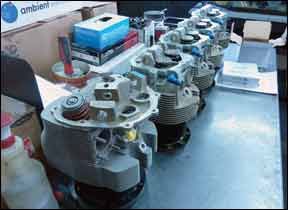Propped up on the assembly bench, aircraft cylinders—regardless of who made them—look almost alike. But they don’t necessarily perform alike, which is why owners contemplating an engine overhaul wring their hands over which jugs to buy.
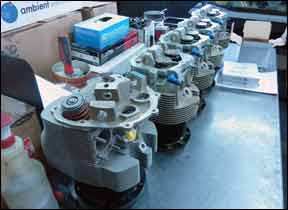
Since the mid-1990s, the cylinder market has waxed and waned with regard to prices, choice and competition. What’s an owner to do? Ask other owners, that’s what. So we recently did just that, surveying nearly 400 owners of piston-powered aircraft about their experiences with cylinders. We also contacted a few shops to query about their recommendations.
Curiously, the cylinder market has, shall we say, evened out since the last time we did this survey. We’re not exactly hearing choruses of Kumbaya here, but the schizophrenic spikes in owner bile toward one company or another seemed to have been displaced by a it’s-not-so-bad resignation toward cylinders that go bad now and then.
Lycoming factory cylinders lead the league in customer satisfaction, but there are fewer complaints about Continental factory cylinders and the shops we spoke, if they make any recommendations at all, stick with the factory offerings. Eight years ago, shops were often recommending either of the two PMA houses, Superior Air Parts or ECI, either on price or performance history. Now, we hear less of that.
The shops, and, to a lesser extent, owners seem to think there are fewer complaints about Continental cylinders going soft prematurely.
What We Asked
During February of 2012, we published our survey on avweb.com, asking aircraft owners to tell us several key things about their experiences with cylinders. We asked about the type of cylinders they had, how many hours were on the engine and what their overall experience with these cylinders had been.
We also asked about specific shortcomings, such as loss of compression, valve guide wear and cracking and respondents were given the opportunity to comment generally on cylinder issues. Altogether, we heard from 502 owners and operators, mostly in the U.S. but from other countries as well. What follows is our summary of owner experiences, leavened by specific relevant comments.
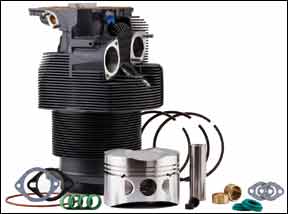
Lycoming
Both Lycoming and Continental faced stiff competition from Superior Air Parts and ECI during the mid-1990s, as both companies introduced competing lines of PMA cylinders for popular engines. Although it had its own quality issues with crankshafts, Lycoming didn’t take the competition lying down. Its cylinders have traditionally had a good reputation for durability and on those engine models where Superior and ECI joined the fray, Lycoming reduced prices aggressively.
We’re sure it has gained back market share as a result, although we don’t know how much. But it has also gained the highest percentage of customer loyalty, at least among our survey takers. An impressive 79 percent of Lycoming cylinder owners said they would buy these jugs again and if we add the somewhat-likely-to-buy-again buyers, the total is 90 percent. That’s as high a customer approval rating as we’ve seen in any of our surveys. Moreover, Lycoming negative perceptions appear to be quite low. Only 3 percent said they wouldn’t buy these cylinders again.
The reason for this high degree of satisfaction is revealed by the details of the survey. When we asked about specific problems with Lycoming cylinders, only small percentages reported such anomalies as premature loss of compression, valve guide wear or high oil consumption.
“I can’t say enough about a factory engine [from Lycoming]. For a small percentage more, you get the best, period,” said owner Claude von Plato. A handful of owners report owning Lycoming engines that have been in service for years without cylinder changes.
“My engine is an O-360-A2F. It’s in a 1969 C177A. It has never had a cylinder off, according to a complete logbook,” says Cardinal owner Monty Keim.
But none of this is to suggest that owners of Lycoming engines don’t have complaints or problems and some of them relate to the well-known Lycoming “morning sickness” of sticking valves.
“Lycoming cylinders on an O-540. Pretty bulletproof at 235 HP output, but you do need to rope and ream the valve guides every 500 hours to avoid a hung valve. Most airplanes just don’t fly regularly and suffer the consequences,” said Jeff Chipetine.
Although complaints about Lycoming cylinders aren’t what we would call frequent, those we do hear often relate to valve issues.
“I had one cylinder overhauled for valve-guide wear,” said Peter Schmeelk. “I got tired of having the spark plug completely fouled with oil. The shop replaced the exhaust valve and springs as we’ll as the valve guide. The cylinder and piston assemblies were factory-new when installed.”
Lycoming factory cylinder bores are nitrided for hardness, which seems to work. We saw few complaints of premature loss of compression or cracking.
Continental
And on that count, Continental fared less we’ll in our survey, with complaints about cylinders going soft just a few hundred hours after being installed. The good news—confirmed by engine shops—is that complaints about premature compression have abated somewhat, since reaching epidemic proportions in the early 2000s. “Now that Continental has put some choke back in the cylinders, that’s pretty much over,” says Charlie Melot at Zephyr Engines in Zephyr Hills, Florida. Nonetheless, Continental factory cylinders don’t engender near the owner loyalty that Lycoming enjoys, according to our survey. Only 40 percent of owners said they would buy Continental again and that rises to 51 percent if the somewhat-likely-to-buys are included. But fully a quarter—26 percent—told us they are unlikely or very unlikely to buy Continental cylinders again.
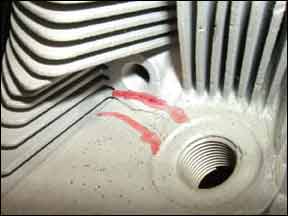
What’s the problem here? The matrix of complaints about Continental cylinders is quite different than what we saw describing Lycoming products. A third of our survey respondents (33 percent) said they had to have a Continental cylinder removed for work for any reason compared to 21 percent for Lycoming owners. The chief complaint continues to be unexpected loss of compression.
“Replaced a [Continental] factory reman with another factory reman. One cylinder showed very low compression (30/80) while still less than a year old. Cylinder replaced under warranty; factory analysis showed valve seat improperly installed—slightly askew and off-center,” said Mooney owner Alan Marcum. Alan Chase had a similar experience: “My IO-550-B lost compression after about 350 hours. Continental replaced them all under warranty.”
Although Continental owners seem to have more complaints about cylinder durability than Lycoming owners do, that’s not to suggest our survey didn’t turn up a lot of satisfied customers. “I fly a TCM reman. The engine has been reliable, sturdy and stable. I have had to repair two cylinders in 1700-plus hours of flying. I do not consider that to be unusual, considering the harsh environment that air-cooled engines live in. TCM did a fine job in remanufacturing my engine. The old adage is true: You must either fly the damn thing or you will have to fix the damn thing! Your choice,” wrote John Voniski. A number of owners voiced similar observations and we think observations from shops that Continental quality has improved carry significant weight.
ECI
All of the cylinder manufacturers have, at one time or another, experienced quality control crises. For ECI, which has the most complete line of PMA cylinders for both types of engines, it was head-to-barrel separation issue that led to an AD. It requires 50-hour inspections/compression checks or replacement of the cylinders in the Titan line. Owners tangled up in this AD are obviously unhappy and although this didn’t seem to dominate the survey comments, it didn’t go unmentioned, either.
“After the big fiasco with ECI parallel-valve engine cylinders and ECI not stepping up with some sort of repair, I will never again purchase or recommend an ECI cylinder. I am essentially stuck with cylinders that do not have any approved repair, have to be thrown away after TBO or, worse yet, could come apart at anytime,” said Curtis Jones, an A&P.
Our survey doesn’t reveal if this episode specifically dented ECI’s customer loyalty, but we did note a slight decline in customer preferences toward ECI. When we asked this question in 2008, 80 percent said they’d buy ECI cylinders again, but this time around, 58 percent said they would be likely to buy ECI cylinders again. Similarly, shops told us they are neither recommending nor avoiding ECI cylinders, but rather making the customer aware of the choice and letting them decide for themselves.
Of the 74 customers we heard from, 20 told us they had to remove cylinders unexpectedly, or 20 percent—about the same as for Lycoming. Common complaints seem to relate to cracking or the aforementioned AD.
“My partner in the airplane at that time talked me into using ECI cylinders at overhaul. I have had several problems with the cylinders over the years and do not plan on using them in the future. I am going to stay with OEM products, Lycoming or Continental,” said Curt Aalund.
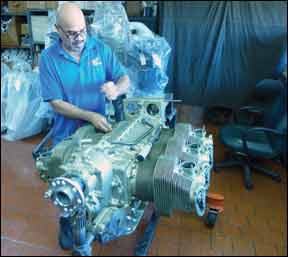
But ECI can claim plenty of success stories, too, like this one from owner Rich Giblin: “I topped this IO-550A in 2004 using ECI cylinders (because they were highly rated by Aviation Consumer). Flew them hard for 1573 hours without issues and very low oil consumption. Majored the engine in late 2011 (2725 hours on the bottom end) and discovered a small crack in one ECI cylinder. Had Penn Yan rebuild the same engine using ECIs again. Should start break-in this week.”
Superior Air Parts
The hard luck company among our Gang of Four cylinder builders is Superior Air Parts. It came into the market with a big bang in the 1990s with the well-regarded Millennium line of cylinders. But things went downhill for Superior when it was purchased by the German diesel engine company, Thielert AG, in 2006.
Two years later, the GA market tanked and Superior went bankrupt, removing a major competitor from the market. Superior reorganized and in 2010 was snapped up by a consortium of Weifang Tianxiang Technology Group and the Chinese government. It operates as a subsidiary of Superior Aviation, Beijing, but as far we know, none of the products are made in China.
A year ago, Superior began slowly ramping up production of Millennium cylinders for some popular Lycoming and Continental engines. Having been in hibernation for two years, Superior didn’t loom large in our survey, nor is it a bright blip on the radar of field overhaul shops we talked to. (These shops have definitely tilted toward factory cylinders.)
Survey responses on Superior were somewhat polarized. About half said they would definitely buy them again, while an additional 19 percent said they were somewhat likely to purchase Superior cylinders again. But 20 percent said they were unlikely to buy Superior cylinders again, a negative second only to Continental.
We’re not quite sure why this is so, since a low percentage of readers reported problems with Superior cylinders and there’s no clear pattern to the complaints. We heard from three readers who reported premature compression loss, three with valve guide wear and three with high oil consumption.
Recommendations
As noted earlier, the last time we did our cylinder survey, Lycoming and ECI came out as clear winners. In this survey, Lycoming has, improbably, improved its rating among survey takers and it gets few complaints.
ECI has declined a little, but perhaps not so much to be of consequence. The same can’t be said of Continental. Although we weren’t overwhelmed with brickbats hurled at Continental, its overall satisfaction ratings remain the lowest of all the companies surveyed.
With that in mind, for Lycoming engines, we don’t see a compelling reason to use anything other than factory cylinders unless the factory price is significantly higher because there’s no PMA competition, in which case overhauled cylinders may be an option. For a couple of hundred bucks more per cylinder, we wouldn’t sniff about paying for the factory parts, given what appears to us to be sterling performance. If you have sound first-run Lycoming cylinders, ask your shop about the option of overhauling them. It might be a cost-effective option.
Conclusions on Continental cylinders are less clear cut. We hate to weasel out on this, but the data just doesn’t support black-and-white conclusions. The shops we interviewed tell us they’re fielding far fewer complaints and returns on Continental factory cylinders than they were five years ago.
It’s possible that the low ratings and negative comments we collected in our survey are artifacts from the days when so many owners had trouble with their Continental cylinders. Or perhaps the survey wording resulted in inconsistent responses.
Either way, we lean toward ECI cylinders for Continental engines for now. And considering how much owners seem to like ECI’s Nickle+Carbide treatment, if budget allows, we think it’s worth considering for any new cylinder as a hedge against premature wear and corrosion, especially for an engine that’s not flown frequently. And these days, that’s most engines.
As for Superior, we’ll keep an eye on their return to production, pricing and delivery schedules. For now, we just don’t have enough data to judge the new products. But we see Superior’s re-entry into the market as nothing but good news, given how the OEM inflate prices for cylinders for which there’s no PMA competitor.

